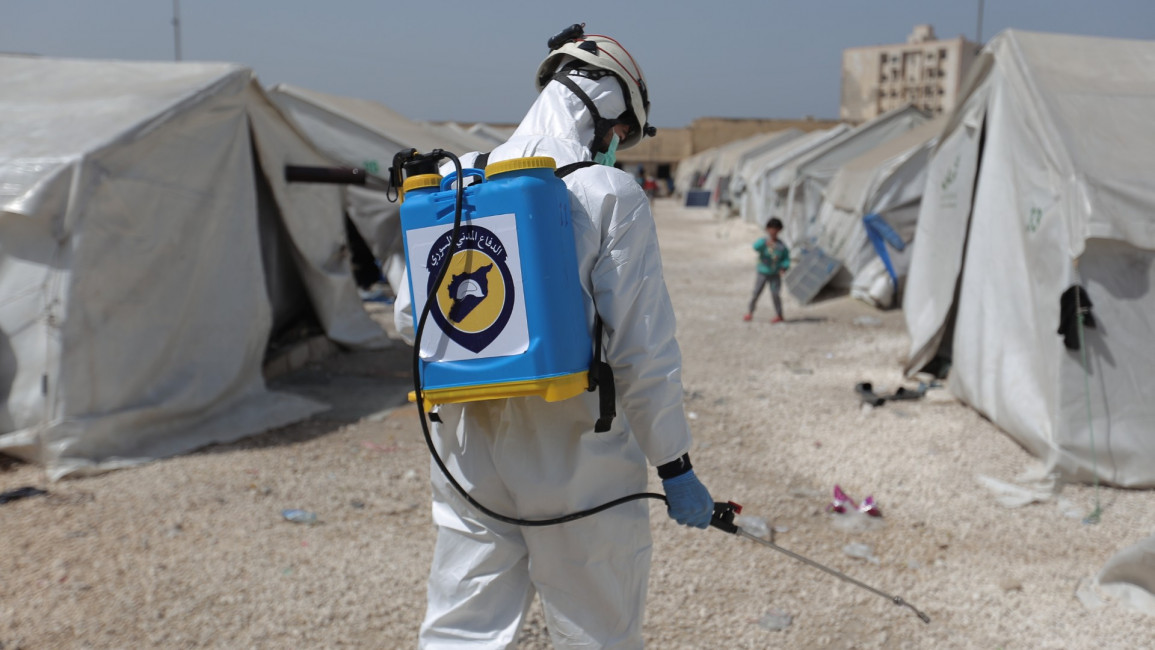Coronavirus 'disaster in the making' in war-torn Syria
The outbreak has infected more than 1.8 million people and killed more than 112,000 around the world since emerging in China in December last year.
In Syria, the Damascus government has closed borders, forbidden movement between provinces and shut schools and restaurants in an effort to stem the spread of the virus.
Official numbers are low with two deaths and 25 confirmed cases, but only 100 patients are being tested daily, with half of the testing carried out in the capital Damascus.
And while the government has regained control of most of the country after almost a decade of civil war, some areas are still held by pro-Ankara rebels and Kurds.
Experts accuse Damascus of minimising its death toll for political motives.
Read also: Syria Weekly: Assad regime finally acknowledged as chemical attacks culprit
"Medical staff believe that there are many people who are dying in Syria with the symptoms of the virus," said Zaki Mehchy, senior consulting fellow at London-based think tank Chatham House.
"But the security agencies ask them or order them not to mention it, especially to the media," he added.
'Impossible physical distancing’
Aid groups are sounding the alarm on the potentially devastating consequences of a severe outbreak in Syria, where nine years of war have hit hospitals and left them ill-equipped to deal with the pandemic.
"There is a disaster in the making," said Emile Hokayem, Middle East analyst at the International Institute for Strategic Studies in London (IISS).
According to the World Health Organisation (WHO), less than two-thirds of hospitals were up and running at the end of 2019 and 70 percent of healthcare workers have fled since the war began in 2011.
The International Committee of the Red Cross (ICRC) warned that physical distancing is impossible in displacement camps in Idlib, the last rebel-held province, which was already enduring a humanitarian crisis before the pandemic started.
Twitter Post
|
"A lack of food, clean water and exposure to cold weather have already left hundreds of thousands of people in poor health, making them even more vulnerable," said Misty Buswell from aid group International Rescue Committee (IRC), adding that the devastation in Idlib could be "unimaginable".
The IRC said that almost all of the 105 intensive care beds and 30 adult ventilators in Idlib were already in use.
WHO said testing would start in Idlib at the end of March, but little help is to be expected from Damascus, according to Mazen Gharibah, associate researcher at the London School of Economics.
"One cannot simply assume that the regime - which was systematically targeting the hospitals three weeks ago - is going to provide the same hospitals with medical equipment next week," he said.
Activists have repeatedly accused the government of targeting hospitals in rebel-held areas, a charge denied by Damascus.
'Catastrophic politicisation'
A ceasefire negotiated at the beginning of March for the northwest region between the two main foreign power brokers in Syria's war, Russia and Turkey, has so far held.
But according to the IRC, "the security and political vacuum the pandemic will create is likely to be exploited by actors involved in the Syrian conflict - including ISIS (jihadists) - to serve their interests”, the organisation said, using an alternative acronym for IS.
For Syria expert Fabrice Balanche, associate professor and research director at the University of Lyon 2, "this epidemic is a way for Damascus to show that the Syrian state is efficient, and all territories should be returned under its governance".
But Gharibah said politicisation of the pandemic by the Syrian government was catastrophic, accusing the regime of "using the current pandemic for its own political gains by gambling with the lives of millions of people".
Experts say there is a risk that the pandemic will lead to a decrease in humanitarian assistance as donor countries focus on kickstarting their economies.
Insta-fail: App celebrates birthday of Syrian regime insider’s son in coronavirus post
"With attention and resources at home focused on recovery, it is going to be a lot harder to make a political case for sustaining humanitarian operations abroad," Hokayem said.
Aid groups warned against cuts in aid at a time when needs are critical.
"Should we fail, not only will the most vulnerable pay the price today for the inaction of the international community, the consequences will be felt across the globe for years, if not decades, to come," said IRC president David Miliband.
The Covid-19 virus, which was first detected in China's Wuhan in December, has killed more than 114,332 people worldwide, while over 1,857,115 infections have been confirmed.
The majority of those that infected with Covid-19 experience only mild or moderate symptoms, including fever and a dry cough.
There are still no known treatments for the virus, though more than 428,333 have already recovered from the infection.
Syria has confirmed 25 cases of the virus which has so far killed 2 people in the country.
Agencies contributed to this report.
Follow us on Facebook, Twitter and Instagram to stay connected



